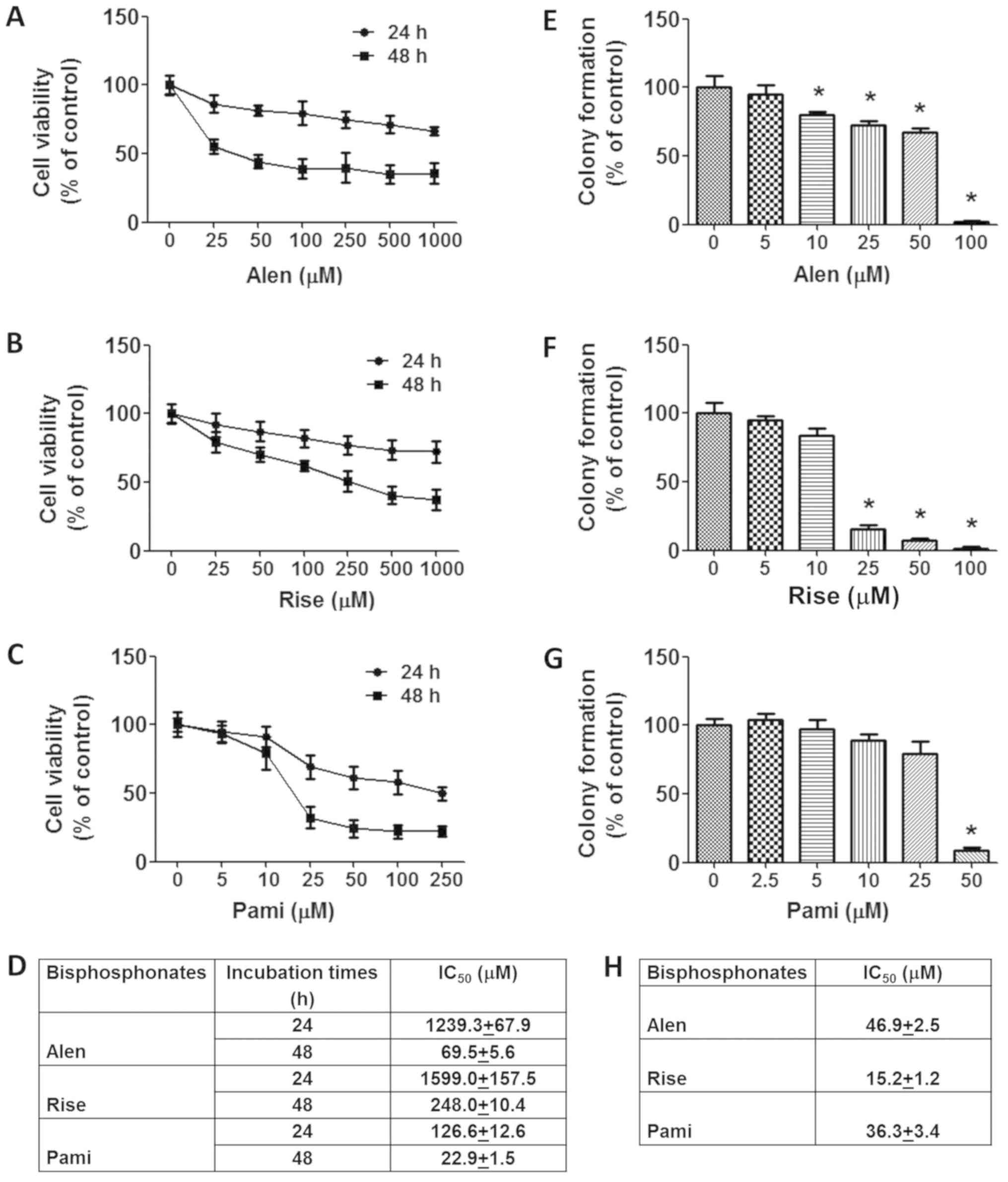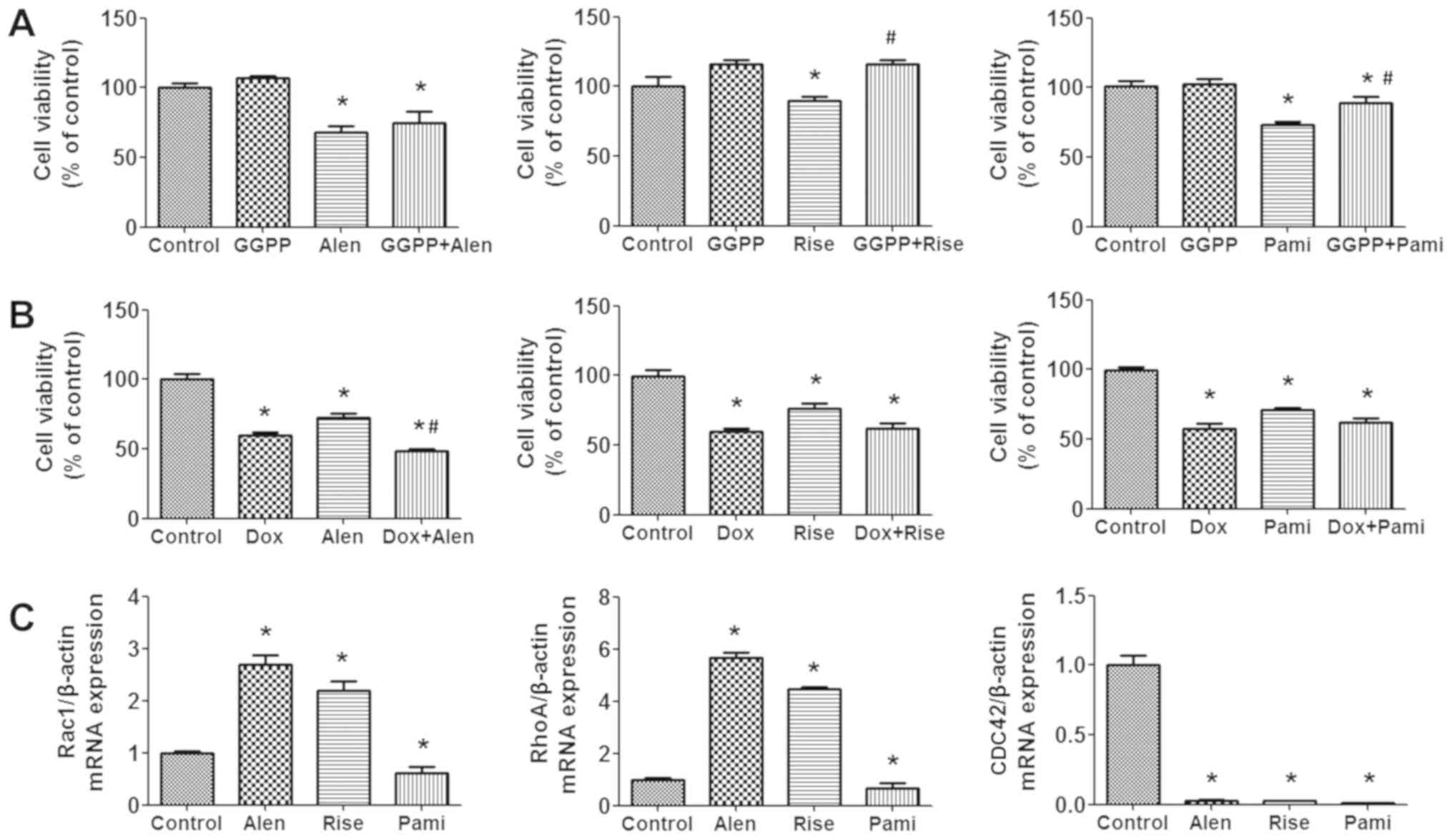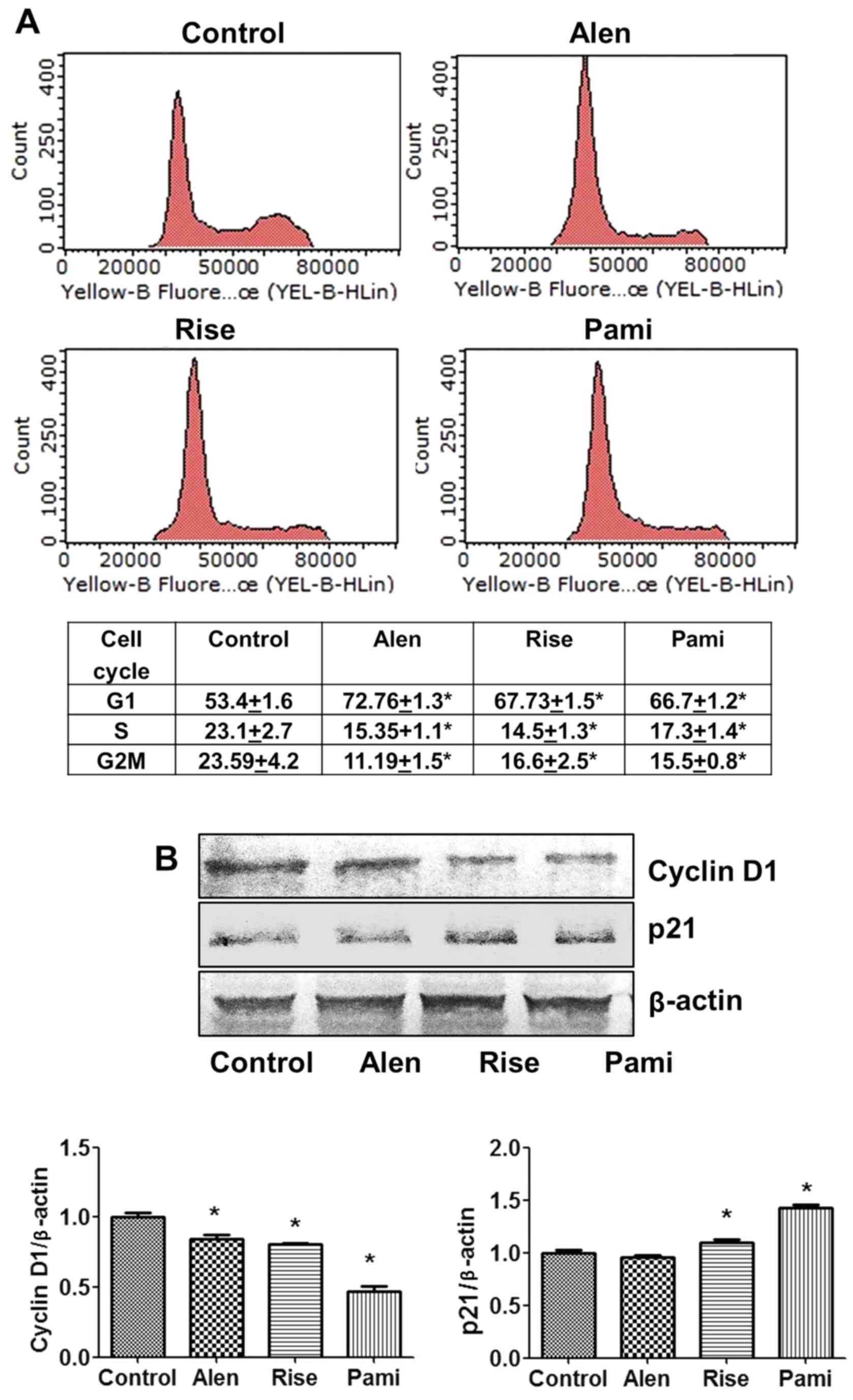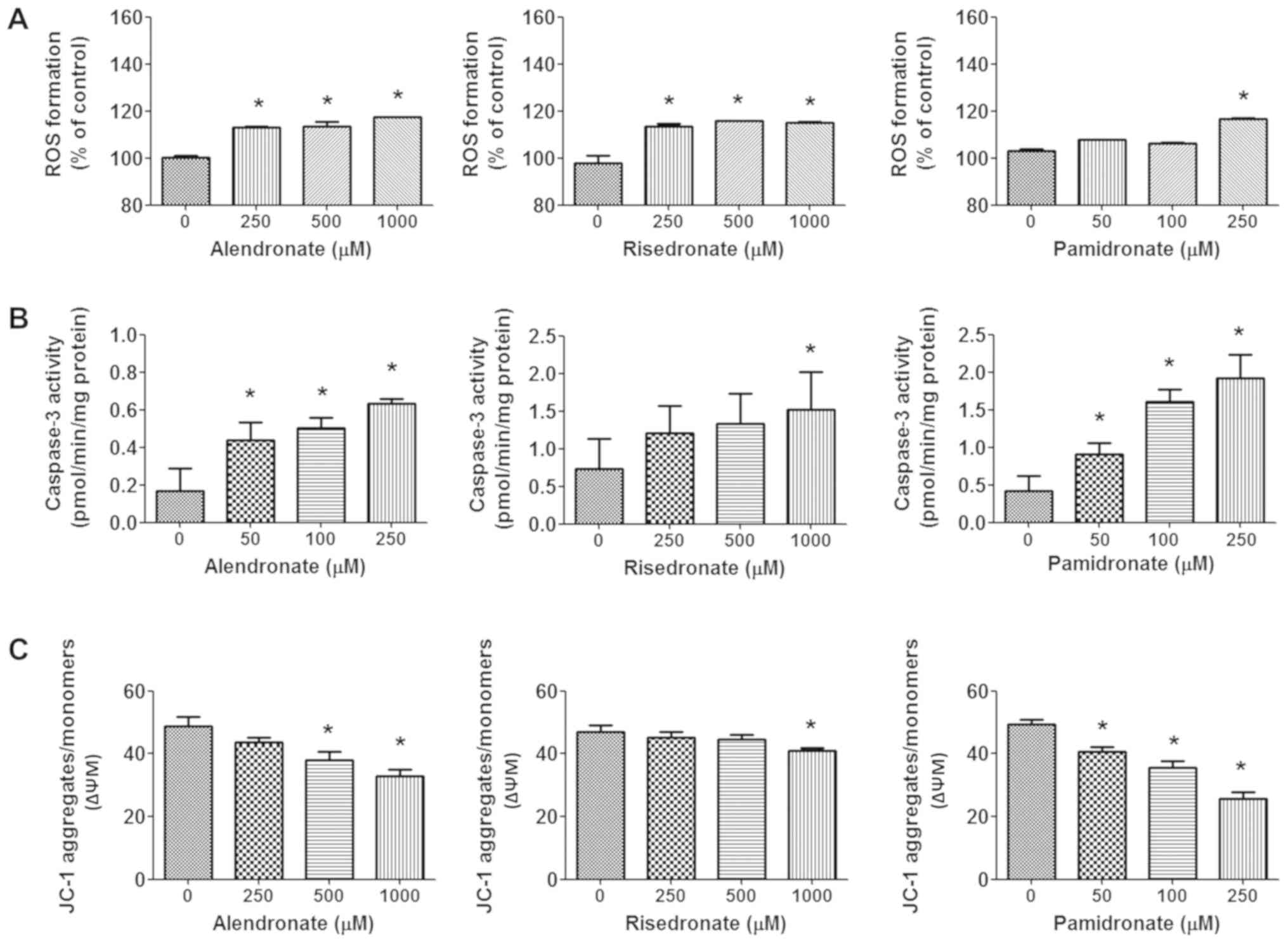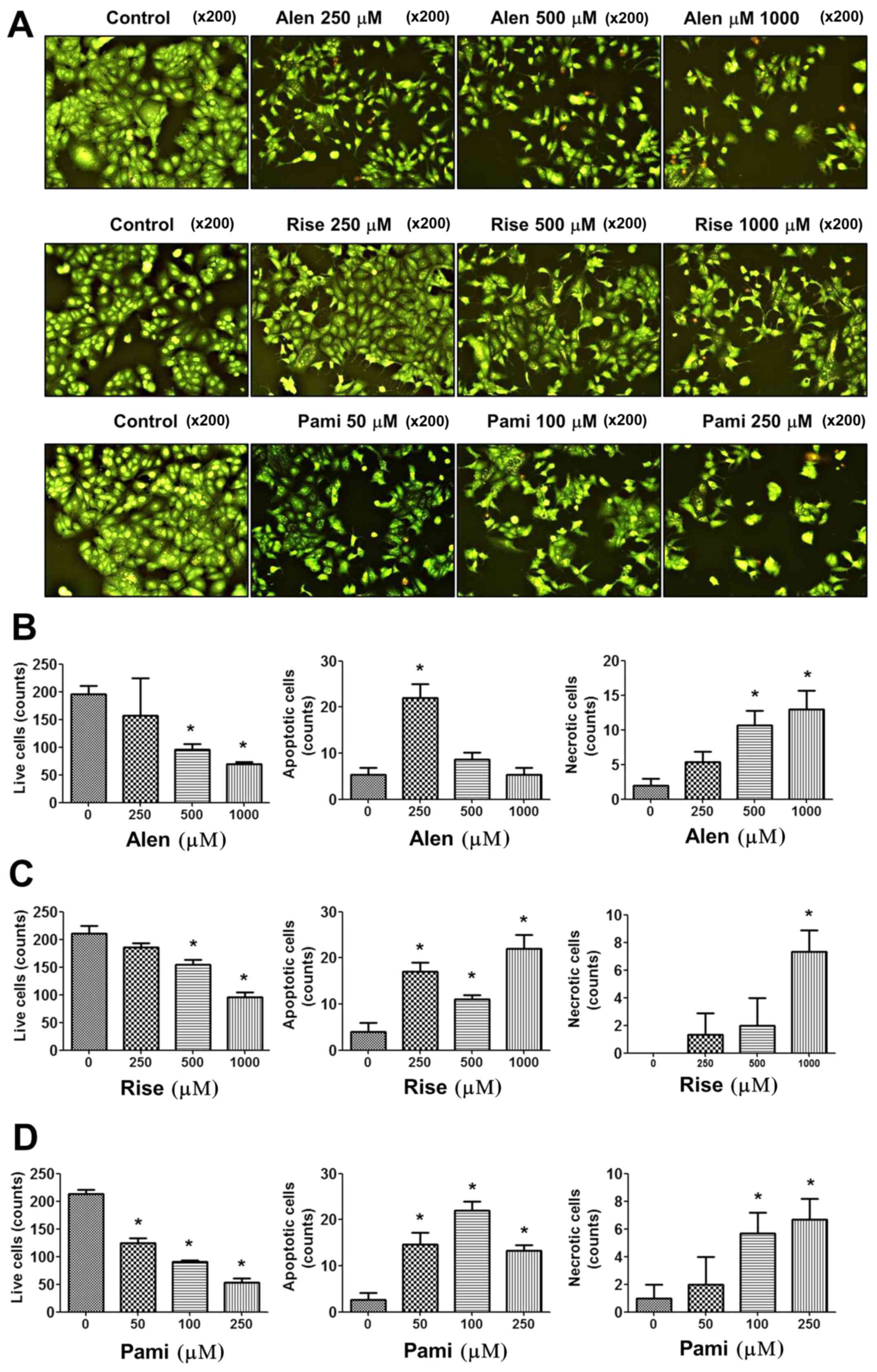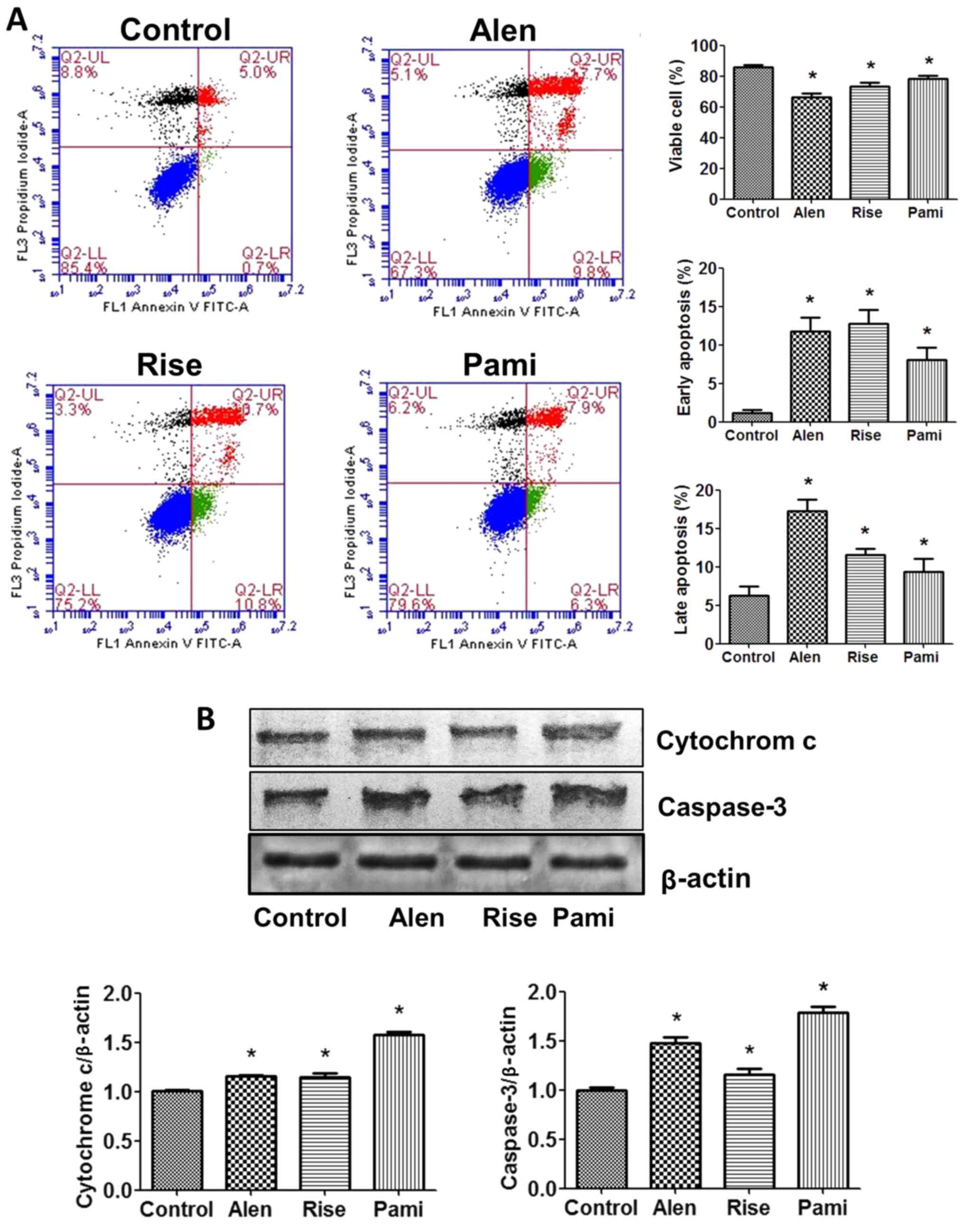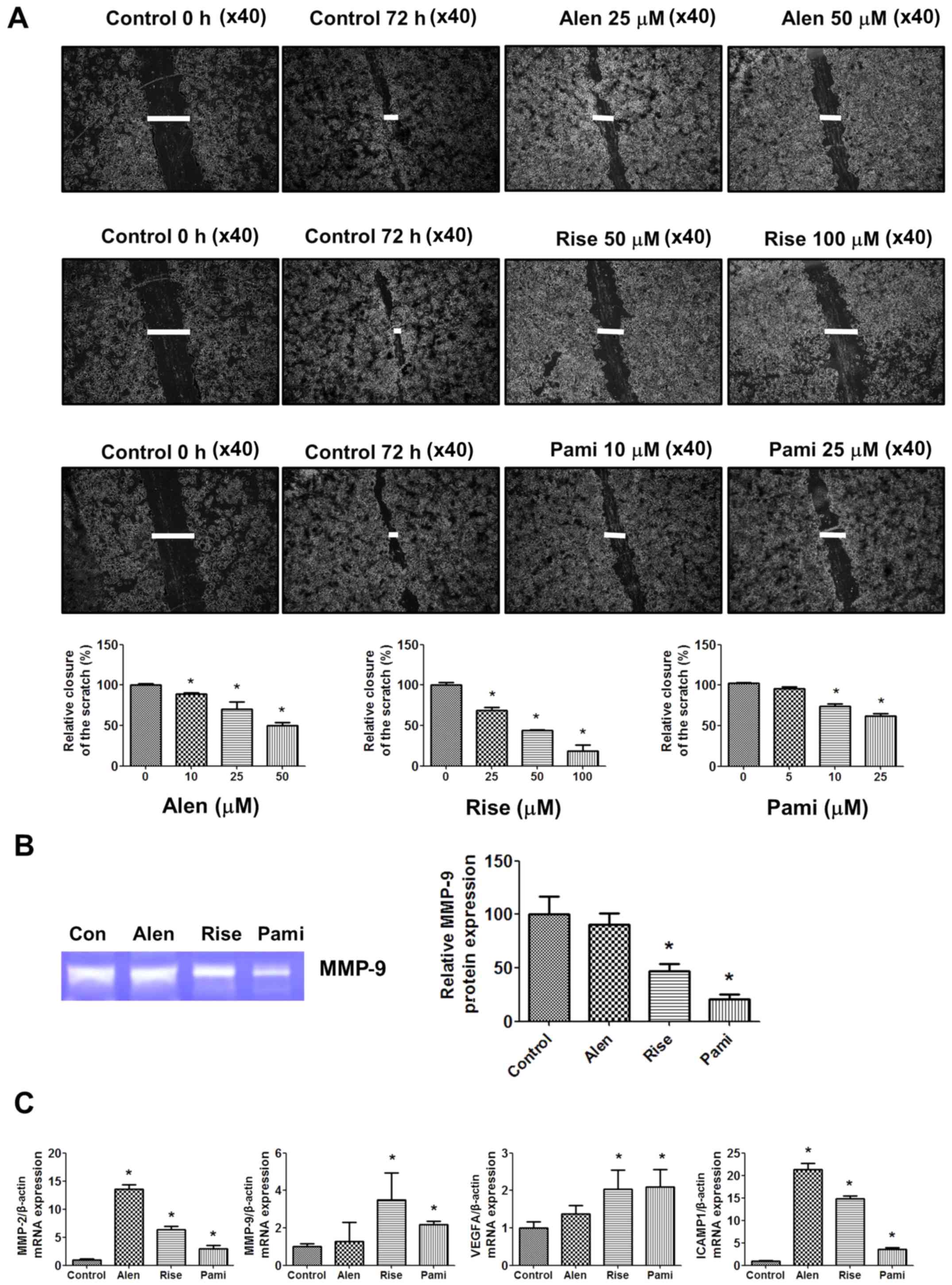|
1
|
Gnant M and Clézardin P: Direct and
indirect anticancer activity of bisphosphonates: A brief review of
published literature. Cancer Treat Rev. 38:407–415. 2012.
View Article : Google Scholar : PubMed/NCBI
|
|
2
|
Labropoulou VT, Theocharis AD, Symeonidis
A, Skandalis SS, Karamanos NK and Kalofonos HP: Pathophysiology and
pharmacological targeting of tumor-induced bone disease: Current
status and emerging therapeutic interventions. Curr Med Chem.
18:1584–1598. 2011. View Article : Google Scholar : PubMed/NCBI
|
|
3
|
Fleisch H: Development of bisphosphonates.
Breast Cancer Res. 4:30–34. 2002. View
Article : Google Scholar : PubMed/NCBI
|
|
4
|
Rogers MJ, Gordon S, Benford HL, Coxon FP,
Luckman SP, Monkkonen J and Frith JC: Cellular and molecular
mechanisms of action of bisphosphonates. Cancer. 88:2961–2978.
2000. View Article : Google Scholar : PubMed/NCBI
|
|
5
|
Clezardin P: Potential anticancer
properties of bisphosphonates: Insights from preclinical studies.
Anticancer Agents Med Chem. 12:102–113. 2012. View Article : Google Scholar : PubMed/NCBI
|
|
6
|
Jagdev SP, Coleman RE, Shipman CM, Rostami
HA and Croucher PI: The bisphosphonate, zoledronic acid, induces
apoptosis of breast cancer cells: Evidence for synergy with
paclitaxel. Br J Cancer. 84:1126–1134. 2001. View Article : Google Scholar : PubMed/NCBI
|
|
7
|
Goffinet M, Thoulouzan M, Pradines A,
Lajoie-Mazenc I, Weinbaum C, Faye JC and Séronie-Vivien S:
Zoledronic acid treatment impairs protein geranyl-geranylation for
biological effects in prostatic cells. BMC Cancer. 6:602006.
View Article : Google Scholar : PubMed/NCBI
|
|
8
|
Koshimune R, Aoe M, Toyooka S, Hara F,
Ouchida M, Tokumo M, Sano Y, Date H and Shimizu N: Anti-tumor
effect of bisphosphonate (YM529) on non-small cell lung cancer cell
lines. BMC Cancer. 7:82007. View Article : Google Scholar : PubMed/NCBI
|
|
9
|
Ou YJ, Chiu HF, Wong YH and Yang YH:
Bisphosphonate use and the risk of endometrial cancer: A
meta-analysis of observational studies. Pharmacoepidemiol Drug Saf.
25:1107–1115. 2016. View
Article : Google Scholar : PubMed/NCBI
|
|
10
|
Passarelli MN, Newcomb PA, LaCroix AZ,
Lane DS, Ho GY and Chlebowski RT: Oral bisphosphonate use and
colorectal cancer incidence in the Women's Health Initiative. J
Bone Miner Res. 28:2043–2048. 2013. View Article : Google Scholar : PubMed/NCBI
|
|
11
|
Guo RT, Cao R, Liang PH, Ko TP, Chang TH,
Hudock MP, Jeng WY, Chen CK, Zhang Y, Song Y, et al:
Bisphosphonates target multiple sites in both cis- and
trans-prenyltransferases. Proc Natl Acad Sci USA. 104:10022–10027.
2007. View Article : Google Scholar : PubMed/NCBI
|
|
12
|
Mönkkönen H, Auriola S, Lehenkari P,
Kellinsalmi M, Hassinen IE, Vepsäläinen J and Mönkkönen J: A new
endogenous ATP analog (ApppI) inhibits the mitochondrial adenine
nucleotide translocase (ANT) and is responsible for the apoptosis
induced by nitrogen-containing bisphosphonates. Br J Pharmacol.
147:437–445. 2006. View Article : Google Scholar : PubMed/NCBI
|
|
13
|
Luckman SP, Hughes DE, Coxon FP, Graham R,
Russell G and Rogers MJ: Nitrogen-containing bisphosphonates
inhibit the mevalonate pathway and prevent post-translational
prenylation of GTP-binding proteins, including Ras. J Bone Miner
Res. 13:581–589. 1998. View Article : Google Scholar : PubMed/NCBI
|
|
14
|
Wada A, Fukui K, Sawai Y, Imanaka K, Kiso
S, Tamura S, Shimomura I and Hayashi N: Pamidronate induced
anti-proliferative, apoptotic, and anti-migratory effects in
hepatocellular carcinoma. J Hepatol. 44:142–150. 2006. View Article : Google Scholar : PubMed/NCBI
|
|
15
|
Coxon JP, Oades GM, Kirby RS and Colston
KW: Zoledronic acid induces apoptosis and inhibits adhesion to
mineralized matrix in prostate cancer cells via inhibition of
protein prenylation. BJU Int. 94:164–170. 2004. View Article : Google Scholar : PubMed/NCBI
|
|
16
|
Wakchoure S, Merrell MA, Aldrich W,
Millender-Swain T, Harris KW, Triozzi P and Selander KS:
Bisphosphonates inhibit the growth of mesothelioma cells in vitro
and in vivo. Clin Cancer Res. 12:2862–2868. 2006. View Article : Google Scholar : PubMed/NCBI
|
|
17
|
Denoyelle C, Hong L, Vannier JP, Soria J
and Soria C: New insights into the actions of bisphosphonate
zoledronic acid in breast cancer cells by dual RhoA-dependent and
-independent effects. Br J Cancer. 88:1631–1640. 2003. View Article : Google Scholar : PubMed/NCBI
|
|
18
|
Qie S and Diehl JA: Cyclin D1, cancer
progression, and opportunities in cancer treatment. J Mol Med
(Berl). 94:1313–1326. 2016. View Article : Google Scholar : PubMed/NCBI
|
|
19
|
Vega FM and Ridley AJ: Rho GTPases in
cancer cell biology. FEBS Lett. 582:2093–2101. 2008. View Article : Google Scholar : PubMed/NCBI
|
|
20
|
Yoshida T, Zhang Y, Rivera Rosado LA, Chen
J, Khan T, Moon SY and Zhang B: Blockade of Rac1 activity induces
G1 cell cycle arrest or apoptosis in breast cancer cells through
downregulation of cyclin D1, survivin, and X-linked inhibitor of
apoptosis protein. Mol Cancer Ther. 9:1657–1668. 2010. View Article : Google Scholar : PubMed/NCBI
|
|
21
|
Rachner TD, Singh SK, Schoppet M, Benad P,
Bornhäuser M, Ellenrieder V, Ebert R, Jakob F and Hofbauer LC:
Zoledronic acid induces apoptosis and changes the TRAIL/OPG ratio
in breast cancer cells. Cancer Lett. 287:109–116. 2010. View Article : Google Scholar : PubMed/NCBI
|
|
22
|
Buranrat B, Senggunprai L, Prawan A and
Kukongviriyapan V: Simvastatin and atorvastatin as inhibitors of
proliferation and inducers of apoptosis in human cholangiocarcinoma
cells. Life Sci. 153:41–49. 2016. View Article : Google Scholar : PubMed/NCBI
|
|
23
|
Livak KJ and Schmittgen TD: Analysis of
relative gene expression data using real-time quantitative PCR and
the 2(-Delta Delta C(T)) method. Methods. 25:402–408. 2001.
View Article : Google Scholar : PubMed/NCBI
|
|
24
|
Porter AP, Papaioannou A and Malliri A:
Deregulation of Rho GTPases in cancer. Small GTPases. 7:123–138.
2016. View Article : Google Scholar : PubMed/NCBI
|
|
25
|
Orgaz JL, Herraiz C and Sanz-Moreno V: Rho
GTPases modulate malignant transformation of tumor cells. Small
GTPases. 5:e290192014. View Article : Google Scholar : PubMed/NCBI
|
|
26
|
Mahtani R and Jahanzeb M: Bisphosphonates
as anticancer therapy for early breast cancer. Clin Breast Cancer.
10:359–366. 2010. View Article : Google Scholar : PubMed/NCBI
|
|
27
|
Sahai E and Marshall CJ: RHO-GTPases and
cancer. Nat Rev Cancer. 2:133–142. 2002. View Article : Google Scholar : PubMed/NCBI
|
|
28
|
Cayrol C, Knibiehler M and Ducommun B: p21
binding to PCNA causes G1 and G2 cell cycle arrest in p53-deficient
cells. Oncogene. 16:311–320. 1998. View Article : Google Scholar : PubMed/NCBI
|
|
29
|
Brugarolas J, Chandrasekaran C, Gordon JI,
Beach D, Jacks T and Hannon GJ: Radiation-induced cell cycle arrest
compromised by p21 deficiency. Nature. 377:552–557. 1995.
View Article : Google Scholar : PubMed/NCBI
|
|
30
|
Niculescu AB III, Chen X, Smeets M, Hengst
L, Prives C and Reed SI: Effects of p21(Cip1/Waf1) at both the G1/S
and the G2/M cell cycle transitions: pRb is a critical determinant
in blocking DNA replication and in preventing endoreduplication.
Mol Cell Biol. 18:629–643. 1998. View Article : Google Scholar : PubMed/NCBI
|
|
31
|
Lung JC, Chu JS, Yu JC, Yue CT, Lo YL,
Shen CY and Wu CW: Aberrant expression of cell-cycle regulator
cyclin D1 in breast cancer is related to chromosomal genomic
instability. Genes Chromosomes Cancer. 34:276–284. 2002. View Article : Google Scholar : PubMed/NCBI
|
|
32
|
Nelsen CJ, Kuriyama R, Hirsch B, Negron
VC, Lingle WL, Goggin MM, Stanley MW and Albrecht JH: Short term
cyclin D1 overexpression induces centrosome amplification, mitotic
spindle abnormalities, and aneuploidy. J Biol Chem. 280:768–776.
2005. View Article : Google Scholar : PubMed/NCBI
|
|
33
|
Sandor V, Senderowicz A, Mertins S,
Sackett D, Sausville E, Blagosklonny MV and Bates SE: P21-dependent
g(1)arrest with downregulation of cyclin D1 and upregulation of
cyclin E by the histone deacetylase inhibitor FR901228. Br J
Cancer. 83:817–825. 2000. View Article : Google Scholar : PubMed/NCBI
|
|
34
|
Ghavami S, Hashemi M, Ande SR, Yeganeh B,
Xiao W, Eshraghi M, Bus CJ, Kadkhoda K, Wiechec E, Halayko AJ and
Los M: Apoptosis and cancer: Mutations within caspase genes. J Med
Genet. 46:497–510. 2009. View Article : Google Scholar : PubMed/NCBI
|
|
35
|
Senaratne SG, Pirianov G, Mansi JL, Arnett
TR and Colston KW: Bisphosphonates induce apoptosis in human breast
cancer cell lines. Br J Cancer. 82:1459–1468. 2000. View Article : Google Scholar : PubMed/NCBI
|
|
36
|
Ebert R, Meissner-Weigl J, Zeck S, Määttä
J, Auriola S, Coimbra de Sousa S, Mentrup B, Graser S, Rachner TD,
Hofbauer LC and Jakob F: Probenecid as a sensitizer of
bisphosphonate-mediated effects in breast cancer cells. Mol Cancer.
13:2652014. View Article : Google Scholar : PubMed/NCBI
|
|
37
|
Morrissey MA, Hagedorn EJ and Sherwood DR:
Cell invasion through basement membrane: The netrin receptor DCC
guides the way. Worm. 2:e261692013. View Article : Google Scholar : PubMed/NCBI
|
|
38
|
Green JR: Antitumor effects of
bisphosphonates. Cancer. 97:840–847. 2003. View Article : Google Scholar : PubMed/NCBI
|
|
39
|
Boissier S, Ferreras M, Peyruchaud O,
Magnetto S, Ebetino FH, Colombel M, Delmas P, Delaissé JM and
Clézardin P: Bisphosphonates inhibit breast and prostate carcinoma
cell invasion, an early event in the formation of bone metastases.
Cancer Res. 60:2949–2954. 2000.PubMed/NCBI
|
|
40
|
Teronen O, Heikkilä P, Konttinen YT,
Laitinen M, Salo T, Hanemaaijer R, Teronen A, Maisi P and Sorsa T:
MMP inhibition and downregulation by bisphosphonates. Ann N Y Acad
Sci. 878:453–465. 1999. View Article : Google Scholar : PubMed/NCBI
|
|
41
|
Stearns ME and Wang M: Alendronate blocks
metalloproteinase secretion and bone collagen I release by PC-3 ML
cells in SCID mice. Clin Exp Metastasis. 16:693–702. 1998.
View Article : Google Scholar : PubMed/NCBI
|
|
42
|
Raftopoulou M and Hall A: Cell migration:
Rho GTPases lead the way. Dev Biol. 265:23–32. 2004. View Article : Google Scholar : PubMed/NCBI
|
|
43
|
Idris AI, Rojas J, Greig IR, Van't Hof RJ
and Ralston SH: Aminobisphosphonates cause osteoblast apoptosis and
inhibit bone nodule formation in vitro. Calcif Tissue Int.
82:191–201. 2008. View Article : Google Scholar : PubMed/NCBI
|
|
44
|
Shmeeda H, Amitay Y, Gorin J, Tzemach D,
Mak L, Ogorka J, Kumar S, Zhang JA and Gabizon A: Delivery of
zoledronic acid encapsulated in folate-targeted liposome results in
potent in vitro cytotoxic activity on tumor cells. J Control
Release. 146:76–83. 2010. View Article : Google Scholar : PubMed/NCBI
|















